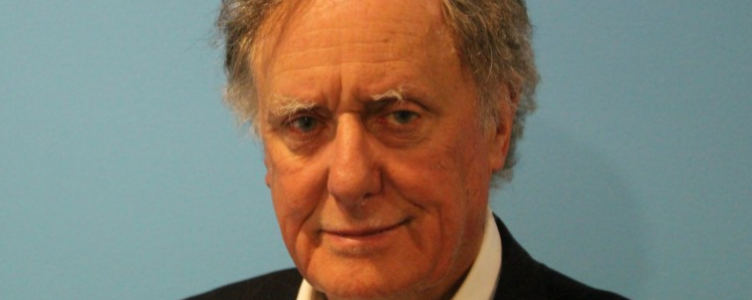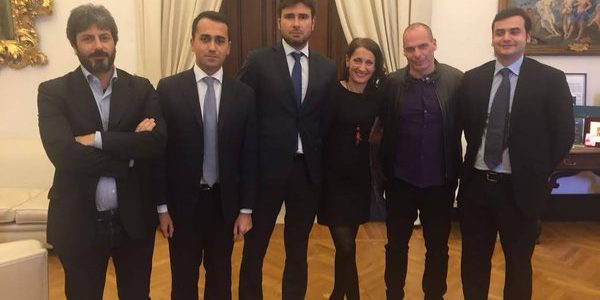
A Painful Lesson From Brexit: Why DiEM25 needs a simpler message
For years the signs have been on the wall. The Tea Party in the United States. Golden Dawn in Greece. The Alternatif für Deutschland. UKIP’s inexorable rise in the UK. Etc. etc. We saw these signs. We analysed their historic and political causes. We developed a cosmopolitan narrative of how ‘another’ Europe, ‘another’ world is possible.
But, unforgivably, we missed the most important thing about all this: that those on the bottom of the social heap are consumed by Deep Discontent that leaves them in no mood for complexity – they have no time for sophisticated, complicated analyses, or for lofty political agendas.
Where we failed, the Right succeeded: Right-wingers found a way to exploit the Deep Discontent. And their solution was simple:
Simplicity! What the nationalist, nativist Right offer is exactly this: SIMPLICITY
Millions of working Americans feel they are destined for the scrapheap, discarded, despised, neglected. We saw how they need nothing more than a big Trumpian wave of the hand to imagine it is possible to get rid of all that is pressing them down and once again hope for the future. It’s so totally understandable that they want that hope, and that they flock to anybody who says they can restore it with a simple sentence:
TAKE BACK CONTROL OF YOUR COUNTRY!
MAKE AMERICA GREAT AGAIN!
In a media-saturated age, that sort of sound-bite sticks like shit to a shoe…while all the whiffle and whaffle of us liberals, democrats, Marxists, utopians etc. is just too vague and too conditional.
Things have got so bad for the bottom end of society that they feel free in Janis Joplin’s and Nikos Kazantzakis’ sense: Freedom as another word for nothing left to lose. Indeed, they are prepared to lose whatever they are left with if they can, in the process, express their rage by voting for someone who will piss off those they consider responsible for their loss of control.
It’s a revolution all right, but not as we know it, not the one we wanted, envisaged, or have any idea how to ride.
The facts are simple but have never really been stated simply: For the past three decades, 80% of the people are taken to the cleaners 95% of the time by the top 20% of society. Since the mid-1970s, once the first post-war capitalist phase ended (with the collapse of the New Deal-inspired Bretton Woods system), those relying on wage income to live have fallen off the escalator. Most of the gains from technology, productivity, globalisation, have gone to the top 1% and none to the bottom 80%. People can put up with poverty, but not with humiliation – not with having their noses rubbed in their poverty by people in yachts, golf clubs and Mercedes Benzes, telling them that their poverty is self-inflicted.
Worse still, all conventional parties are offering slight variants of the system that has failed this 80% of the people. We need to be much more radical than that to entice them back, away from the sirens of the xenophobic Right.
What can we do to reach those people? They are the foot-soldiers and we need their energy and anger. But they’ve been corralled by lethal buffoons of the Right, like Boris Johnson, Marine Le Pen, Nigel Farage and Donald Trump, who directed their righteous anger at the wrong targets.
How can WE re-engage those people?
For now, this is an open question. Not one to be answered lightly or in haste. Brexit should give us pause.
One thing that is clear is that DiEM25 is now more important than ever. Our message from the beginning was simple: The EU will either be democratised or it will disintegrate! Brexit has confirmed our point.
But our message needs to be simplified further.
We need to explain exactly what we mean by democratisation.
We need to explain to those drawn by Trumpian/Brexiterian simplicity why democratising Europe matters to them.
We need to counter the Trumpian/Brexiterian simplicity with a simple (but not oversimplified) message of our own.
In short, we need to pitch progressive simplicity versus regressive oversimplification.
But, as we all know, simplicity requires lots of (often complicated) work.
Let’s get down to it.
Brian Eno & Yanis Varoufakis

In memoriam: Michel Rocard & the Modest Proposal for Resolving the Euro Crisis
It was with great sorrow that I learned of Michel Rocard’s passing. Since 2013, when he wrote the Preface to our Modest Proposal for Resolving the Euro Crisis, Michel has been a valued interlocutor and supporter. Only a few weeks ago, we were planning to meet up in Paris in the Fall to discuss his further contribution to DiEM25. He will be missed.
Michel Rocard’s Foreword to “A Modest Proposal for Solving the Eurozone Crisis”
“A modest proposal”: I love this title. The proposal is indeed modest. It is modest in that it requires the modification of no treaty t. It is also modest in that it never directly attacks the sovereign position of a major state, notably Germany.
Finally, the proposal is modest in the way that it presents itself as nothing more than a little financial tinkering, without launching a noisy debate over fundamental but controversial proposals. Yet it is modest neither in in its ambition, nor in its intelligence, nor even less in its significance. Its ambition is indicated in the title: it seeks nothing less than to “solve the Eurozone crisis.” We have been immersed in this crisis for five or six years. Each of the makeshift solutions imposed on the euro’s mechanisms, procedures, and communal institutions has provoked new tremors and led to a new status quo which, for many involved, is far from offering lasting reassurance.
Even if the crisis seems less imminent than it once did, the fact that governments went into debt to limit the risks caused by the enormous financial crash of 2006-2008 still leaves a permanent threat hovering the eighteen countries that use the currency, whose public debt is denominated in euros, thus threatening the euro itself. This threat is only aimed at a currency, it is also aimed at eighteen countries’ societal endeavor to give themselves with a collective force that is worthy of their past. The threat is thus geopolitical and global, as is the aspiration to overcome it.
The proposal’s intelligence is worthy of its ambition. Combining different domains of knowledge (including macroeconomics, financial science, or public finance law) that are rarely summoned to integrate their most sophisticated lessons, the proposal depends on a subtle use of the narrow elbow room that some actors retain from treaties that are entirely inspired by the mutual suspicion between signatory states, as well as between states and the institutions they created, while also drawing on the most important intuitions of economics, which for decades have been disregarded by monetary authorities.
This proposal thus asserts the improbable: that there may well be a solution.
I will leave it to the reader to experience the surprise and pleasure of reading this book. As for myself, I found no insurmountable objection that would make its claims impossible.
As for significance, the book could not be more serious. What is at stake is quite simply whether Europe is condemned to a recession the pitiless effects of which leave it with no choice other than decline, or whether a different vision of economic mechanisms and their rules can lead to less alarming alternatives. This is the challenge that the states to whom this “Modest Proposal” is addressed must answer. The price of the much-needed positive answer is the destruction of the dangerous Malthusian taboos that are now sealing our fate.
-Michel Rocard, former Prime Minister, France.
Modeste proposition pour résoudre la crise de la zone euro (A Modest Proposal for Solving the Eurozone Crisis), by James K. Galbraith, Stuart Holland, and Yanis Varoufakis, with a preface by Michel Rocard, Les Petits Matins/Institut Veblen, January 2014.

The EU, its elites and its hyper fans had this coming
By Vincent Browne
The European Union, its elites, its hyper fans had this coming to them.
They deliberately devised a supposedly idealistic project of a united Europe, founded on the subversion of democracy across the continent – the exclusion of the meddlesome masses, on an agenda that, inevitably, was going to deepen inequality.
All the bluster of a “social Europe” was just that. It was, essentially, never about anything other than the further enrichment of the rich, right from the inception of the European Coal and Steel Community in 1951.
One of the “visionary” founders of the European project, Robert Schuman said that European Coal and Steel Community was “to make war not only unthinkable but materially impossible” – and he may have believed that.
But what became of it was a huge cartel that enriched the shareholders and managers of the coal and steel industries. And so it has continued ever since.
The Euro project has progressed by similar deceptions.
Lisbon problems
Just recall the machinations that underpinned the infamous Lisbon Treaty. In its original form, it was a new Constitution for Europe to replace and extend the then existing European Treaties.
It was agreed among the Member States in October 2004 and went for ratification among them.
Some such states, including Ireland, had to ratify the Constitution via referenda (incidentally, Tony Blair promised a referendum in the UK on the Constitution).
The French and Dutch people decisively rejected the Constitution in July 2005, after which the Constitution project was abandoned.
A “period of reflection” was undertaken.
Then, deception
That reflection led to a decision effectively to deceive the people of Europe and have the essence of the Constitution ratified, without resorting to annoying referenda – except in Ireland.
This was what became the Lisbon Treaty, drafted in such a way as to make it indecipherable to the mass of people throughout Europe.
Then when Ireland voted against it again – thereby scuttling the project once more, for the Treaty required ratification by all member states – remember what happened?
Ireland was required to vote again, under the guise of significant changes to the Treaty (a lie) and under the threat of expulsion or marginalisation from the EU if the Irish people didn’t comply (another lie).
We wilted and approved.
Ironically, had we refused again to approve that Treaty, it might not have been possible for the UK to leave the EU for there was no mechanism to do so until the Lisbon Treaty came along.
Subverting democracy
Incidentally, our own Supreme Court had ordained in the case Crotty V Taoiseach in 1987 that all changes to EU Treaties required the consent of the Irish people in a referendum, for such changes amounted to changes in our own Constitution.
This case had been opposed vigorously by the then Irish government and by our domestic elites who argued that, essentially, the Irish people were too thick to comprehend the subtleties of EU Treaty changes, just as people now argue that the British people were too thick to comprehend the consequence of withdrawal from the EU – precisely the arguments that were proffered in opposition to universal suffrage.
Bit by bit, the European project has subverted democracy by overtly and covertly drawing power from Member States to the centre – most notably via the Maastricht Treaty which led to the creation of a single currency which seemed so sensible at the time.
The ECB
But at a cost, unsuspected by most of us, for it deprived us of control over monetary policy – ultimately over budgetary policy – and created a Leviathan in the form of the democracy-free-zone, the European Central Bank (ECB).
The promises that an “independent” European Commission would fairly reflect the interests of all Member States, including the minnows, and that a further empowered European Parliament would give a modicum of democratic oxygen to the EU were treated as nought when the crisis broke.
Did anyone even refer to the European Parliament during the years of the bail-outs and did anybody bother what the Europeans Commission thought?
Europe openly became the plaything of the Germans and their creation, the ECB.
Remember how Angela Merkel, with her then sidekick Nicholas Sarkozy, got rid of the Prime Ministers of two Member States, Greece and Italy?
Remember when we were brow-beaten into absorbing the €72 billion bank debt for which we had no responsibility or ownership?
Remember the bomb going off in Dublin and not in Frankfurt or was that another delusion of Michael Noonan?
And as we agitatedly wring our hands over Brexit, the Germans and their allies are engaged in devising yet another ruse – a “more flexible Europe” – an EU where they and a few other sidekicks would openly run the show and the rest of us would be spectators (actually not much different to how it is now).
No gumption
There is a chance of reversing much of this if Ireland and a few other States had the gumption to do so but be assured there will be no gumption coming from the Irish side, at least.
The Irish side did not even manage to come up with a contingency plan until Brexit happened – claims to the contrary by Enda Kenny and Michael Noonan that they had been working on this since the British election a year ago have been shattered by Brendan Howlin’s casual assurance that he knew nothing of this even though until 6 May he was Minister for Public Expenditure and Reform.
What we should want
There are a few things we could insist upon: an end to the Euro and the European Central Bank, the replacement of the Council of Ministers with a Senate comprised of two Senators, democratically elected from each Member State (this was a proposal of John Bruton of some years ago before he was colonised).
But there is no chance of that or of anything other than the further consolidation of the power of Germany and the ECB and the further enrichment of the already rich.
Source >> thejournal.ie

One year since the troika imposed capital controls on Greece
One year since the troika imposed capital controls on Greece, the struggle of the Greek people has become the struggle to save Europe
A year has passed since the troika and the ECB closed the Greek banks and imposed capital controls. During the same time, the same culprits are trying to lay the blame for their blatant violation of a monetary union’s logic on the Athens Spring and the Greek people’s determination to escape from the five-year long debt-bondage.
Lest we forget,
- 1. More than a month before the general election of January 2015, in mid December 2014, opinion polls were suggesting a Syriza victory. At that point the ECB triggered began a slow-burning bank run through its Greek representative (the Governor of the Greek Central Bank) who, astoundingly, warned of a “liquidity shortage” about to afflict Greek markets (a word first statement for any central banker in history). It was the first salvo fired against the oncoming Syriza government and a precursor to the capital controls that were always going to be the troika’s weapon against Greece’s anti-troika government.
- On 30th January 2015, three days after the new finance minister, Yanis Varoufakis, took office, the President of the Eurogroup, Mr Jeroen Dijjselbloem, told him in no uncertain terms that the Syriza government’s choice was clear: Either sign up to the troika plan, that Syriza had just won a mandate radically to re-negotiate, or the banks would close within a month.
- On 4th February 2015, without any tangible rationale, the ECB cut Greek banks off, referring them to the Central Bank of Greece’s ELA. It was the precursor to the bank closures and capital controls (the ‘Cyprus solution”, as it was called) with which the troika would attempt to subdue the Greek Prime Minister, Alexis Tsipras.
- By mid-April, a high-ranking official of the ECB, and a few days later the Governor of the Central Bank of Greece, encouraged Yanis Varoufakis to introduce capital controls. Naturally, he refused on the grounds that: (a) capital controls contradict the whole point and logic of a monetary union, and (b) the circumstances demanded an honourable agreement without capital controls or other so-called ‘solutions’.
- By December 2014, the small team around Alexis Tsipras who would (after 25th January 2015) form the core of the new government’s negotiating team had agreed (following written proposals by Yanis Varoufakis) to three counter-measures, against the ECB, when/if the ECB moved to shut down Greece’s banks and impose capital controls. Those three counter-measures were: (a) Signalling to the ECB that any move to shut down Greece’s banks would trigger the Greek government’s unilateral restructuring of the Greek government bonds owned by the ECB (a move that the ECB would want to avert at all cost, given its repercussions on the legal standing of its OMT and QE programs), (b) Setting up a parallel euro-denominated digital payments system, and (c) Changing the Law governing the Central Bank of Greece to regain national sovereignty over it.
- At some point, between March and end of April, against the recommendations of Yanis Varoufakis, PM Tsipras began to drift toward the view that the above three counter-measures (see 5 above) should not be activated. Thus, the troika, having received word that the Athens government would not react to bank closures in a manner that would hurt the ECB, gave the green light to the ECB to proceed with them – and with the imposition of capital controls.
- Despite the hardship, uncertainty and liquidity asphyxiation caused by the bank closures and the capital controls, the Greek people courageously backed the government, with that remarkable 62% OXI vote. They said, in other words, NO to the troika’s blackmail and ordered the government to continue to fight, with all available means, for an honourable agreement.
- On the night of the referendum, PM Tsipras decided to throw in the towel. From that moment onwards, the troika and its Greek (local) ‘associates’ began the attempt to blame the troika-inspired and implemented capital controls on Yanis Varoufakis and all those who continued to remain faithful to the principles and spirit of the Athens Spring.
- A year later, in the wake of an already failed 3rd Bailout Greek ‘program’, capital controls remain in place for the sole purpose of reminding PM Tsipras that he remains under the troika’s thumb.
Today, a year after the ECB-led coup d’ etat against Greece, the EU is disintegrating. The struggle of the Greek people for an honourable agreement with Brussels has now become the struggle for all European democrats to save Europe from its incompetent, authoritarian and historically challenged administrators.

DiEM25 to Italy's Five Star Movement: Dare to change Europe
As the status quo crumbles away, we need neither surrender to the Brussels democracy-free zone nor return to the cocoon of the nation state, but develop an ambitious agenda of radical reform for Europe.
Today more than ever, such an agenda needs to be picked up by a plurality of citizens and social and political forces across Europe. This is why DiEM25 has met with representatives of the Five Star Movement as reported in the press.
The Italian-language article discusses the transformation of the European policy of the Five Star Movement following engagement with DiEM25. Notably, in its moving away from a directly anti-European stance and towards integrating demands for a democratic transformation of the Union.
Read the full article (in Italian) here.

Fintan O’Toole: How Europe’s leaders can fix the union
“The formula for the EU in the last two decades has been: first build larger and larger structures and then try to figure out how to democratise them. The demands of the DiEM25 movement, Open Democracy and others have to be acted on urgently […] There should be no more grand institutional developments until the EU has undergone a revolution in accountability.”
Read the full article here.
Spanish Elections: It’s the European Union, comrades…
- The resulting troika-friendly government will strengthen Schäuble’s hand.
- Podemos now needs DiEM25 more than ever
MADRID, SPAIN, June 27th, 2016.– While there will be ample time for analysis and self-criticism among progressives in Spain over yesterday’s election results, “Brexit” and Unidos Podemos’ lack of a clear and convincing plan for Europe were key to their catastrophic performance at the ballot.
Podemos and its coalition allies made a strategic error to keep quiet on Europe mainly through relying on soundbites instead of having a proper European agenda. Without a meaningful narrative on what a Unidos Podemos-led government would do and say in the EU Council and in the Eurogroup, the “Brexit” shockwaves simply pushed former-PSOE voters who had voted for Podemos last December into two camps: a sizeable few fled back into the troika-trio (PP-Ciudadanos-PSOE) bosom, and the another group sadly abstained from voting. The end result was that the Izquierda Unida votes were neutralised and hope faded.
There are two fundamental problems with not having a plan for Europe. Firstly, it sends the worse type of message to the electorate, one of uncertainty. In fact, without firm programmatic measures on the table, the Spanish electorate had little choice but to retreat into what keeps their country precariously afloat as the Union’s “diligent student.” For Spaniards with a strong European perspective, but nervously awaiting the final dictate from Brussels on their country’s fiscal report card –and the menace of more austerity measures– a vote for Unidos Podemos was equivalent to voting for no alternative strategy, or even chaos.
Secondly, Unidos Podemos’ inability to present a clear European vision reinforced the establishment’s perverse self-image as the only true guardians of the European project; while Podemos et al are depicted as an actual threat to the Union or, at best, unfit to lead. Thus, Unidos Podemos sadly missed the opportunity to expose the actual, and opposing, truth: the establishment is driving Europe to its dangerous demise.
Spain’s likely troika-friendly future government will strengthen Schäuble’s hand to turn the Eurozone into an Iron Cage of Permanent Austerity in response to the “Brexit” (see this) –the Schäuble Plan, as Yanis Varoufakis calls it (see this).
Many questions now remain: Will Podemos realise the error of going into the election without a European Agenda? Will they now collaborate with DiEM25 to create one (as we have much to offer them on this)? Or will they do a “Tsipras” from the opposition benches: talk the good talk about the importance of a ‘different’ Europe, but have nothing to propose against the Schäuble-Dijsselbloem (There Is No Alternative Strategy).
The only imaginable silver lining about yesterday’s terrible result is that Podemos will use its time in opposition productively, and work with with DiEM25 and its pan European partners on a proper European Agenda, rather than being lured into a Syriza II Faustian Bargain.

Disorder under the heaven
Slavoj Žižek, a DiEM25 early signatory, casts his critical eye on the ‘disorder’ of the EU in the light of Brexit. He reminds us that “crises are painful and dangerous” but they are also “the terrain on which battles have to be waged and won”. He writes that the Brexit outcome offers us “a unique chance to react to the need for a radical change in a more appropriate way, with a project that will break the vicious cycle of EU technocracy and nationalist populism.” In a manner reflecting fully the DiEM25 manifesto, he concludes that” “The true division of our heaven is not between anaemic technocracy and nationalist passions, but between their vicious cycle and a new pan-European project which will addresses the true challenges that humanity confronts today.”
Late in his life, Freud asked the famous question “Was will das Weib?”, “What does a woman want?”, admitting his perplexity when faced with the enigma of the feminine sexuality. A similar perplexity arouses today, apropos the Brexit referendum: what does Europe want?
The true stakes of this referendum become clear if we locate it into its larger historical context. In Western and Eastern Europe, there are signs of a long-term re-arrangement of the political space. Till recently, the political space was dominated by two main parties which addressed the entire electoral body, a Right-of-centre party (Christian-Democrat, liberal-conservative, people’s…) and a Left-of-centre party (socialist, social-democratic…), with smaller parties addressing a narrow electorate (ecologists, neo-Fascists, etc.). Now, there is progressively emerging a one party which stands for global capitalism as such, usually with relative tolerance towards abortion, gay rights, religious and ethnic minorities, etc.; opposing this party is a stronger and stronger anti-immigrant populist party which, on its fringes, is accompanied by directly racist neo-Fascist groups. The exemplary case is here Poland: after the disappearance of the ex-Communists, the main parties are the “anti-ideological” centrist liberal party of the ex-prime-minister Donald Tusk and the conservative Christian party of Kaczynski brothers. The stakes of Radical Center today are: which of the two main parties, conservatives or liberals, will succeed in presenting itself as embodying the post-ideological non-politics against the other party dismissed as “still caught in old ideological specters”? In the early 90s, conservatives were better at it; later, it was liberal Leftists who seemed to be gaining the upper hand, and now, it’s again the conservatives.
The anti-immigrant populism brings passion back into politics, it speaks in the terms of antagonisms, of Us against Them, and one of the signs of the confusion of what remains of the Left is the idea that one should take this passionate approach from the Right: “If Marine le Pen can do it, why we should also not do it?” So one should return to strong Nation-State and mobilize national passions… a ridiculous struggle, lost in advance.
So what does Europe want? Basically, Europe is caught into a vicious cycle, oscillating between the Bruxelles technocracy unable to drag it out of inertia, and the popular rage against this inertia, a rage appropriated by new more radical Leftist movements but primarily by Rightist populism. The Brexit referendum moved along the lines of this new opposition, which is why there was something terribly wrong with it. To see this, one should only look at the strange bedfellows that found themselves together in the Brexit camp: right-wing “patriots,” populist nationalists fuelled by the fear of immigrants, mixed with desperate working class rage… is such a mixture of patriotic racism with the rage of “ordinary people” not the ideal ground for a new form of Fascism?
The intensity of the emotional investment into the referendum should not deceive us, the choice offered obfuscated the true questions: how to fight “agreements” like TTIP which present a real threat to popular sovereignty, how to confront ecological catastrophes and economic imbalances which breed new poverty and migrations, etc. The choice of Brexit means a serious setback for these true struggles – suffice it to bear in mind what an important argument for Brexit was the “refugee threat.” The Brexit referendum is the ultimate proof that ideology (in the good old Marxist sense of “false consciousness”) is well and alive in our societies. For example, the case of Brexit exemplifies perfectly the falsity of the calls to restore national sovereignty (the “British people themselves, not some anonymous and non-elected Brussels bureaucrats, should decide the fate of the UK” motif):
“At the heart of the Brexit is a paradox worth articulating! England wants to withdraw from the bureaucratic, administrative control of Brussels, control seen as compromising its sovereignty, in order to be better able to organize the dismantling of its sovereignty (by way of more radical submission to the logic of global capital) on its own. Does this not have the markings of the death drive? The organism wants to die in its own way, on its own terms. This is the paradox at the heart of American Republican thinking: we want to ‘take back our country’ in order to be better able to submit it and pretty much all of life to the logic of the market.”(Eric Santner, personal communication)
Is this paradox not confirmed by a quick look at the conflicts between the UK and the EU in the past decades? When they concerned workers’ rights, it was the EU which demanded limiting the weekly work hours, etc., and the UK government complained that such a measure will affect the competitiveness of the British industry… In short, the so much vilified “Brussels bureaucracy” was also a protector of minimal workers’ rights – in exactly the same way as it is today the protector of the rights of the refugees against many “sovereign” nation-states which are not ready to receive them.
When Stalin was asked in the late 1920s which deviation is worse, the Right one or the Leftist one, he snapped back: “They are both worse!” Was it not the same with the choice British voters were confronting? Remain was “worse” since it meant persisting in the inertia that keeps Europe mired down. Exit was “worse” since it made changing nothing look desirable. In the days before the referendum, there was a pseudo-deep thought circulating in our media: “whatever the result, EU will never be the same, it will be irreparably damaged.” However, it’s the opposite which is true: nothing really changed, just the inertia of Europe became impossible to ignore. Europe will again lose time in long negotiations among the EU members which will continue to make any large-scale political project unfeasible. This is what those who oppose Brexit didn’t see: shocked, they now complain about the “irrationality” of the Brexit voters, ignoring the desperate need for change that the vote made palpable.
For this reason, one should fully support the EU stance that the UK withdrawal should be enacted as fast as possible, without any long preliminary consultations. Understandably, the Brexit partisans in the UK now want have a cake and eat it (or, as a commentator viciously remarked, they want a divorce which will still allow them to share the marital bed). They desperately want to strike a middle road (Boris Johnson’s proposal that the UK should maintain free access to the common market was quite appropriately dismissed as a pipe dream).
The confusion that underlies the Brexit referendum is not limited to Europe: it is part of a much larger process of the crisis of “manufacturing democratic consent” in our societies, of the growing gap between political institutions and popular rage, the rage which gave birth to Trump as well as to Sanders in the US. Signs of chaos are everywhere – a couple of days ago, the debate of the gun control in the US congress turned into a banana republic chaos, with congressmen involved in rough-and-tumble that we usually associate with Third World countries… Is this a reason to despair?
Recall Mao Ze Dong’s old motto: “Everything under heaven is in utter chaos; the situation is excellent.” A crisis is to be taken seriously, without illusions, but also as a chance to be fully exploited. Although crises are painful and dangerous, they are the terrain on which battles have to be waged and won. Is there not a struggle also in heaven, is the heaven also not divided – and does the ongoing confusion not offer a unique chance to react to the need for a radical change in a more appropriate way, with a project that will break the vicious cycle of EU technocracy and nationalist populism? The true division of our heaven is not between anemic technocracy and nationalist passions, but between their vicious cycle and a new pan-European project which will addresses the true challenges that humanity confronts today.
In his Notes Towards a Definition of Culture, T.S.Eliot remarked that there are moments when the only choice is the one between heresy and non-belief, when the only way to keep a religion alive is to perform a sectarian split from its main corpse. This is what has to be done today. Now that, in the echo of the Brexit victory, calls for other exits from EU are multiplying all around Europe, the situation calls for such a heretic project – who will grab the chance? Unfortunately, not the existing Left which is well-known for its breath-taking ability to never miss a chance to miss a chance…

The Day After
Exclusive commentary by James Galbraith for DiEM25
The groundwork for the Brexit debacle was laid last July when Europe crushed the last progressive pro-European government the EU is likely to see – the SYRIZA government elected in Greece in January 2015. Most Britons were not directly engaged with the Greek trauma. Many surely looked askance at the Greek leaders. But they must have noticed how Europe talked down to Greece, how it scolded its officials, how it dictated terms and how it made rebellious country into an example, so that no one else would ever be tempted to follow the same path.
If the destruction of Greece helped set the tone, Leave won by turning the British referendum into an ugly expression of English nativism, feeding on the frustrations of a deeply unequal nation, ironically divided by the very forces of reaction and austerity that will now come fully to power. The political effect has sent a harsh message to Europeans living in Britain, and to the many who would have liked to come. The economic effect will leave Britain in the hands of simpletons who believe that deregulation is the universal source of growth.
That such a campaign could prevail – leading soon to a hard right government in Britain – testifies to the high-handed incompetence of the political, financial, British and European elites. Remain ran a campaign of fear, condescension and bean-counting, as though Britons cared only about the growth rate and the pound. And the Remain leaders seemed to believe that such figures as Barack Obama, George Soros, Christine Lagarde, a list of ten Nobel-prize-winning economists or the research department of the IMF carried weight with the British working class.
Since nothing happens, at first, except the start of negotiations, the immediate economic effects may be small. If the drop in sterling lasts, British exports may actually benefit. If the world gets skittish, the dollar will rise and US exports may suffer, with possible political consequences in America this fall. Otherwise, in the most likely case, the markets will settle down and British life will continue normally at first – except, of course, for immigrants. This will further give the lie to the scare campaign.
Over time, however, as they apply to the United Kingdom, the structures of EU law, regulation, fiscal transfers, open commerce, open borders and human rights built over four decades will now be eroded. Exactly how this will happen – by what process of negotiation, with what retribution from the spurned powers in Brussels and Berlin, by what combination of slow change and abrupt acts, with what consequences for the Union of Scotland to England – is clearly unknown to the leaders of the Leave campaign. This morning they appeared on British television in equal parts triumphant and clueless.
And the crisis now erupts everywhere in Europe: in Holland and France, but also in Spain and Italy, as well as in Germany, Finland and the East. If the hard right can rise in Britain, it can rise anywhere. If Britain can exit, so can anyone; neither the EU nor the Euro is irrevocable. And most likely, since the apocalyptic predictions of economic collapse and “Lehman on steroids” that preceded the Brexit referendum will not come true, such warnings will be even less credible when heard the next time.
The European Union has sowed the wind. It may reap the whirlwind. Unless it moves, and quickly, not merely to assert a hollow “unity” but to deliver a democratic, accountable, and realistic New Deal – or something very much like it – for all Europeans.
James Galbraith is author of “Welcome to the Poisoned Chalice: The Destruction of Greece and the Future of Europe.”